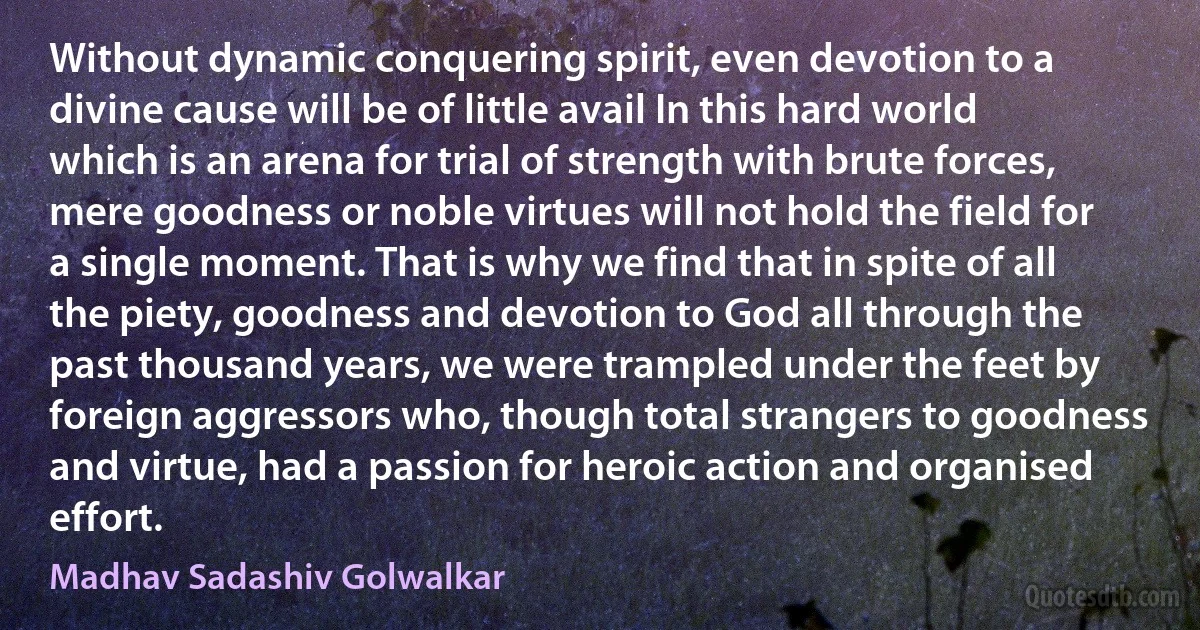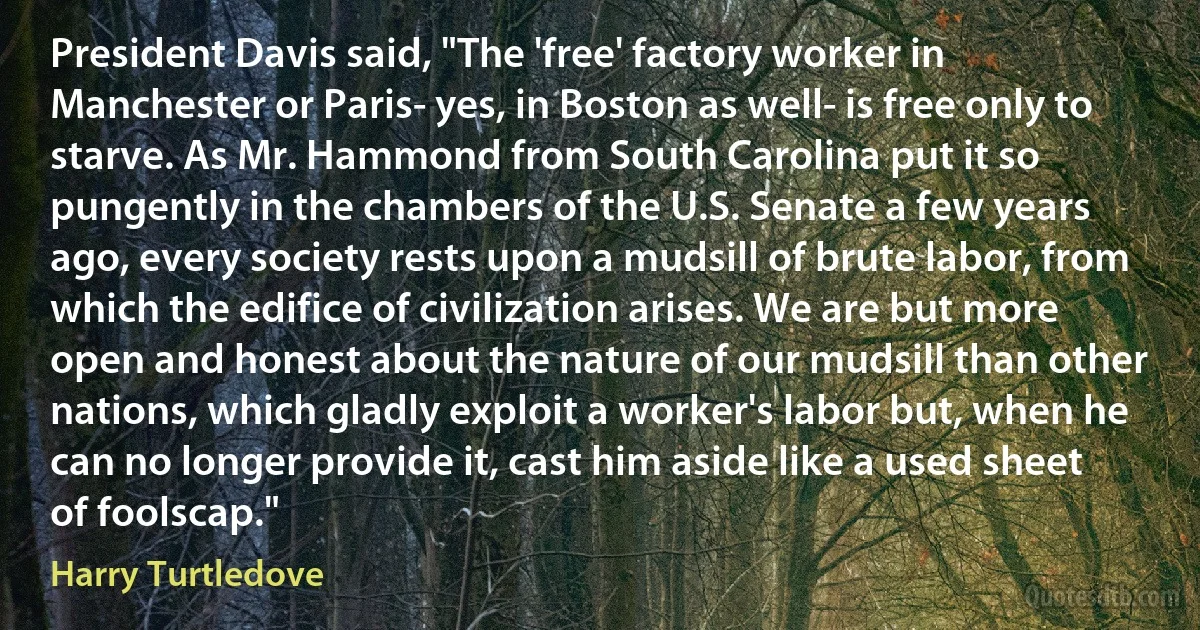Brute Quotes - page 4
In art, immorality cannot exist. Art is always sacred even when it takes for a subject the worst excesses of desire; since it has in view only the sincerity of observation, it cannot debase itself. A true work of art is always noble, even when it translates the stirrings of the brute, for at that moment, the artist who has produced it had as his only objective, the most conscientious rendering possible of the impression he has felt.

Auguste Rodin
All government rests upon consent, and consent is not to be had without taking counsel with the most eminent or influential or representative of the governed, and seeking their advice: the act of taking counsel cannot be separated from the act of exercising authority. All government rests also upon upon habit, upon being exercised in the same way or a similar way to that in which the governed remember or believe that it was exercised before. Brute force can break with habit; but as soon as brute force begins to turn into government, it does so by starting to observe habitual modes of behaviour. Habitual forms or institutions for counsel and consent are thus of the essence of government.

Enoch Powell
To be like other people is the real condition of happiness. Sea air and diversions are producing this miraculous effect upon me. What you need is just the contrary. You are dying of boredom from what most mortals regard as bliss – having nothing to do. You need the treatment opposite to mine; I am not joking in the very least: one has to be compelled to some task, driven to it: anyone who is not a drunken brute must achieve boredom at all costs unless he can discover the secret of a taste for amusements... These reflections.... are not likely to comfort you, but they will change your frame of mind for a few minutes. I shall probably be back in Paris on Thursday...

Eugène Delacroix
The regime maintains its suffocating grip over the citizens by using brute force and repression of dissent. Gruesome acts of public executions are barbaric methods and chilling reminders of the fate of dissenters in Iran. Through fear and humiliation, the regime commands submission. Public stoning of women and the execution of underage youth are revolting reminders of the regime's callous disregard for human life, dignity and civility.

Reza Pahlavi
Throughout their early stages the movements of civilization-for, properly speaking, there was no one movement-were very slow, were local in space, and were partial in the sense that each developed along but few lines. Of the numberless years that covered these early stages we have no record. They were the years that saw such extraordinary discoveries and inventions as fire, and the wheel, and the bow, and the domestication of animals. So local were these inventions that at the present day there yet linger savage tribes, still fixed in the half-bestial life of an infinitely remote past, who know none of them except fire-and the discovery and use of fire may have marked, not the beginning of civilization, but the beginning of the savagery which separated man from brute.

Theodore Roosevelt
Life was growing and spreading here the way a disease propagates and eats and in the eating must kill. There should be something more, he thought. A kind of being might come into the universe that did not want to finally eat everything or to command all or to fill every niche and site with its own precious self. It would be a strange thing, with enough of the brute biology in it to have the quick, darting sense of survival. But it would also have to carry something of the machine in it, the passive and accepting quality of duty, of waiting, and of thought that went beyond the endless eating or the fear of dying. To such a thing the universe would not be a battleground but a theater, where eternal dramas were acted out and it was best to be in the audience. Perhaps evolution, which had been at the beginning a blind force that pushed against everything, could find a path to that shambling, curiously lasting state.

Gregory Benford
Direct and unconcealed brute force and violence-although clearly persisting in many quarters of society-are today less acceptable to an increasingly sophisticated public, a public significantly remote from the methods of social and economic control common to early America. This is not a statement, however, that there is such increased civility that Americans can no longer tolerate social control of the country's under classes by force of violence; rather, it is an observation that Americans today appear to be more inclined to issue endorsement to agents and agencies of control which carry out the task, while permitting the benefactors of such control to retain a semidignified, clean-hands image of themselves.

Huey P. Newton
There certainly is self division. The man who watches a woman undressing has the red eyes of an ape; yet the man who sees two young lovers, really alone for the first time, who brings out all the pathos, the tenderness and uncertainty when he tells about it, is no brute; he is very much human. And the ape and the man exist in one body; and when the ape's desires are about to be fulfilled, he disappears and is succeeded by the man, who is disgusted with the ape's appetite.

Colin Wilson
The large benefits which the divine liberality is constantly bestowing on the wicked are preparing them for heavier judgment. As they neither think that these proceed from the hand of the Lord, nor acknowledge them as his, or if they do so acknowledge them, never regard them as proofs of his favor, they are in no respect more instructed thereby in his mercy than brute beasts, which, according to their condition, enjoy the same liberality, and yet never look beyond it.

John Calvin
Until and unless Self-realisation is attained, Knowledge-Absolute is gained, there is ever the ebb and flow, the constant see-saw between the animal and the man in every human being. The beast or the brute is never completely absent or overcome except through a final Divinisation of the individual. As long as there is the human, side by side there will be the animal also, now the one having the upper hand, now the other.

Swami Sivananda
It may be, however, sufficient to say, that wherever the church has had power it has been a crime for any man to speak his honest thought. No church has ever been willing that any opponent should give a transcript of his mind. Every church in power has appealed to brute force, to the sword, for the purpose of sustaining its creed. Not one has had the courage to occupy the open field. The church has not been satisfied with calling Infidels and unbelievers blasphemers. Each church has accused nearly every other church of being a blasphemer. Every pioneer has been branded as a criminal. The Catholics called Martin Luther a blasphemer, and Martin Luther called Copernicus a blasphemer. Pious ignorance always regards intelligence as a kind of blasphemy. Some of the greatest men of the world, some of the best, have been put to death for the crime of blasphemy, that is to say, for the crime of endeavoring to benefit their fellow-men.

Robert G. Ingersoll
You listen and live prudently, in fact you do not live at all, but work and save and are burdened with cares; and so your whole life passes. Then, all of a sudden, the whole thing turns upside down; times come when the world mocks at reason, when the Church shuts its doors and is silent, when authority becomes mere brute force, when they who have made their money honestly and with the sweat of their brows lose both their time and their money, and the violent win the game. No one recognizes your efforts and there is no one to help or advise you how to keep what you have earned and saved. Can this be? Surely this cannot be?

Ivo Andrić
Gentlemen, there is a sublime and friendly Destiny by which the human race is guided, - the race never dying, the individual never spared, - to results affecting masses and ages. Men are narrow and selfish, but the Genius or Destiny is not narrow, but beneficent. It is not discovered in their calculated and voluntary activity, but in what befalls, with or without their design. Only what is inevitable interests us, and it turns out that love and good are inevitable, and in the course of things. That Genius has infused itself into nature. It indicates itself by a small excess of good, a small balance in brute facts always favorable to the side of reason.

Ralph Waldo Emerson



